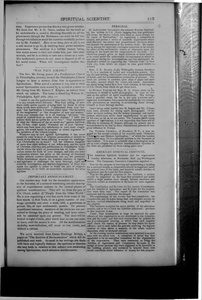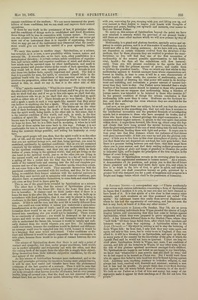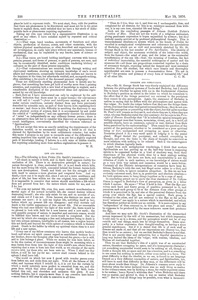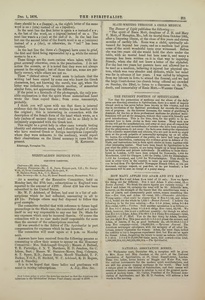< Lord Bacon a Spiritualist (continued from page 3-192) >
...
Was Paul Joking
The Rev. Mr. Group, pastor of a Presbyterian Church in Philadelphia, recently invited the Philadelphia Liberal League to hear a sermon from him in opposition to Spiritualism. What sort of a sermon it was, and to what extent Spiritualists were scared by it, is told in a letter to Mr. Group from Mr. Damon Y. Kilgore, an extract from which we subjoin. The letter is dated 605 Walnut St., Philadelphia, April 26th, 1875:—
I failed to see the application of your text—“try the spirits”—to any remark which followed. Was Paul joking, or were there really spirits capable of being tried by those to whom these word, were addressed? I understood from your “sermon that Spiritualism is founded either upon “the deception of the imagination” or “the deception of men and women.” From of typhoid fever or some other disease,” I infer you believe there are no spirits for us to “try.” Your statements of what the “denizens of the pit would say” against Spiritualism, “if they could speak,” reminded me of your “sermon” which may have been very satisfactory to your usual congregation, but would hardly be accepted as sound argument by the members of the Liberal League.
Whatever may be said against Spiritualism, it has never raised its voice in favor of religious persecution or stained its hands in the blood of those refusing to accept its teachings. Can Christianity say as much? Let the infamous slaughter of more than eight millions of our fellow-men, and the spirit of Christian churches and publications in Philadelphia to-day decide where the spirit of persecution has its home. Spiritualism denies the truth of your charges, and asks you what explanation science has given to the moving of Inanimate bodies without contact—phenomena you say are produced. While Spiritualism spurns the baseless slanders of bigotry and ignorance it challenges the most thorough, rigid, and scientific investigation, and teaches forgiveness of those who speak lies against it, either to tickle the ears of religious superstition, or to build an unenviable reputation for noisy egotism.
Important Announcement
Our readers may look for the immediate appearance, in the Scientist, of a series of interesting articles descriptive of experimental seances in the several phases of spiritual manifestations. They will be from the pen of Col. Olcott, author o! “People from the Other World.” He is now organizing a very tine circle from some of the best minds in New York, to sit a given number of evenings (probably ten) once a week, with a gentleman in private life, of rare mediumistic powers. To prevent impertinent intrusion, members of the circle are not permitted to divulge the place of meeting, and none others will be admitted upon any pretext. The door will be locked at eight o’clock, after which time no one can enter or leave, until the séance is over. All the manifestations including materializations, will occur in the light, and without a cabinet.
<Untitled>
A Japanese Notion.—A correspondent says:—“I have accidentally come across such curious information concerning a form of Spiritualism in Japan that I mention it to you, in case you may not have chanced to have heard of it. It is that spirits of a low class in that country enter animals, and such creatures as are thus possessed are called ‘Fox spirits.’ My informant learnt this orally from several Japanese with whom he has had the opportunity of conversing, and has not seen the fact in any book, or heard of it from any other source.”
Life and Death
Sir,—The following is from Fichte (Dr. Smith’s translation):—
“All death in nature is birth, and in death itself appears visibly the exaltation of life. There is no destructive principle in nature; for nature throughout is clear, unclouded life: it is not death which kills, but the more living life which, concealed behind the former, bursts forth into new development. Death and birth are but the struggle of life with itself to assume a more glorious and congenial form. And my death,—how can it be aught else, since I am not a mere semblance and show of life, but bear within me the one original, true, essential life? It is impossible to conceive that nature should annihilate a life which does not proceed from her; the nature which exists for me, and not I for her.
“Yet even my natural life, even this mere outward manifestation to mortal sight of the inward invisible life, she cannot destroy without destroying herself; she who only exists for me, and on account of me, and exists not if I am not. Even because she destroys me must she animate me anew; it is only my higher life, unfolding itself in her, before which my present life can disappear; and what mortals call death is the visible appearance of this second life. Did no reasonable being who had once beheld ‘the light of this world’ die, there would be no ground to look with faith for a new heaven and a new earth; the only possible purpose of nature, to manifest and maintain reason, would be fulfilled here below, and her circle would be completed. But the very act by which she consigns a free and independent being to death is her own solemn entrance, intelligible to all reason, into a region beyond this act itself, and beyond the whole sphere of existence which is thereby closed. Death is the ladder by which my spiritual vision rises to a new life and a new nature.
“Every one of my fellow-creatures who leaves this earthly brotherhood, and whom my spirit cannot regard as annihilated because he is my brother, draws my thoughts after him beyond the grave,—he is still, and to him belongs a place. While we mourn for him here below, as in the dim realms of unconsciousness there might be mourning when a man bursts from them into the light of this world’s sun, above there is rejoicing that a man is born into that world, as we citizens of the earth receive with joy those who are born unto us. When I shall one day follow, it will be but joy for me; sorrow shall remain behind in the sphere I shall have left.
“The world on which but now I gazed with wonder passes away from before me, and sinks from my sight. With all the fulness of life, order, and increase which I beheld in it, it is yet but the curtain by which a world infinitely more perfect is concealed from me, and the germ from which that other shall develops itself. My faith looks behind this veil, and cherishes and animates this germ. It sees nothing definite, but it expects more than it can conceive here below—more than it will ever be able to conceive in all time.
“Thus do I live, thus am I, and thus am I unchangeable, firm, and completed for all eternity, for this is no existence assumed from without, it is my own true, essential life and being.”
Such are the concluding passages of Johann Gottlieb Fichte’s Vocation of Man. They are not the words of a religious enthusiast, giving passionate expression to hopes unjustified by science; but they embody results arrived at by profound philosophical thought. This is transcendental idealism—a system which in the hands of Fichte far excelled in metaphysical completeness and coherence the speculations of Berkeley, which are so well and accurately sketched by Mr. St. George Stock in the last number of The Spiritualist. The identity of subject and object, the necessary evolution of the latter—the world, from the former—the mind of man, and the latter as the existential manifestation of the one life—God; the meaning of freedom, the fact of individual immortality, the essential nothingness of matter and- the sensuous life—all these are propositions connected together by a chain of necessary thought, requiring indeed the deepest and most sustained attention from the student, but which once clearly and thoroughly apprehended are seen to possess a demonstrative force. We see in spirit “the promise and potency of every form of terrestrial life,” and of all other life.
How Many Apples did Adam and Eve Eat?
Some say Eve 8 and Adam 2—a total of 10 only. Now we figure the thing out far different. Eve 8 and Adam 8 also—total, 16. Boston Journal. We think the above figures are entirely wrong.' If Eve 8 and Adam 82, certainly the total will be 90. Scientific men, however, on the strength of the theory that the antediluvians were a race of giants, and consequently great eaters, reason something like this:—Eve 81st, and Adam 82—total, 163.— Gloucester Advertiser. Wrong again; what could be clearer than if Eve 8-1-lst, and Adam 8-1-2, would not the whole be 1,623?—Boston Journal. I believe the following to be the true solution:—Eve 8-1-4 Adam, Adam 8-1-2-4 Eve—total, 8,698.— Veritas. Still another calculation is as follows:— If Eve 8-1-4 Adam, Adam 8-1-2-4-2 oblige Eve—total, 82,056. We think, however, this is not a sufficient quantity; for though we admit that Eve 8-1-4 Adam, Adam if he 80-8-l-2-4-2keep Eve company—total, 1,082,056.—N. Y. Mail. You do the fair thing by Adam, brother, but you slight Eve. This poor smit-10-1-8-1-4-2 please the serpent, and Adam, of course, if he, as good husbands do, oft-10-80-8-l72-4-2 keep Eve company—total, 109,099,384.— Syracuse Journal. The American newspaper calculators, with the savagery of all other historians, meanly stigmatise the woman. Adam, the mere dupe, Jacked the nobility to try a dangerous experiment first, but Eve ate an apple for dinner. Adam, forgetting the injury to many an unborn 1,000,000-8-1-40-2. 1-0-4-2-8-10,000,000 times more, that' coward—true total, 1,000,000,814,021,042,919,099,384.—The Spiritualist.
Editor's notes
- ↑ Was Paul Joking by unknown author, Spiritual Scientist, v. 2, No. 10, May 13, 1875, p. 115
- ↑ Important Announcement by unknown author, Spiritual Scientist, v. 2, No. 10, May 13, 1875, p. 115
- ↑ notice by unknown author, London Spiritualist, No. 195, May 19, 1876, p. 233
- ↑ Life and Death by unknown author (signed as C.C.M.), London Spiritualist, No. 195, May 19, 1876, p. 238
- ↑ How Many Apples did Adam and Eve Eat? by unknown author, London Spiritualist, No. 223, December 1, 1876, p. 211
Sources
-
Spiritual Scientist, v. 2, No. 10, May 13, 1875, p. 115
-
London Spiritualist, No. 195, May 19, 1876, p. 233
-
London Spiritualist, No. 195, May 19, 1876, p. 238
-
London Spiritualist, No. 223, December 1, 1876, p. 211




